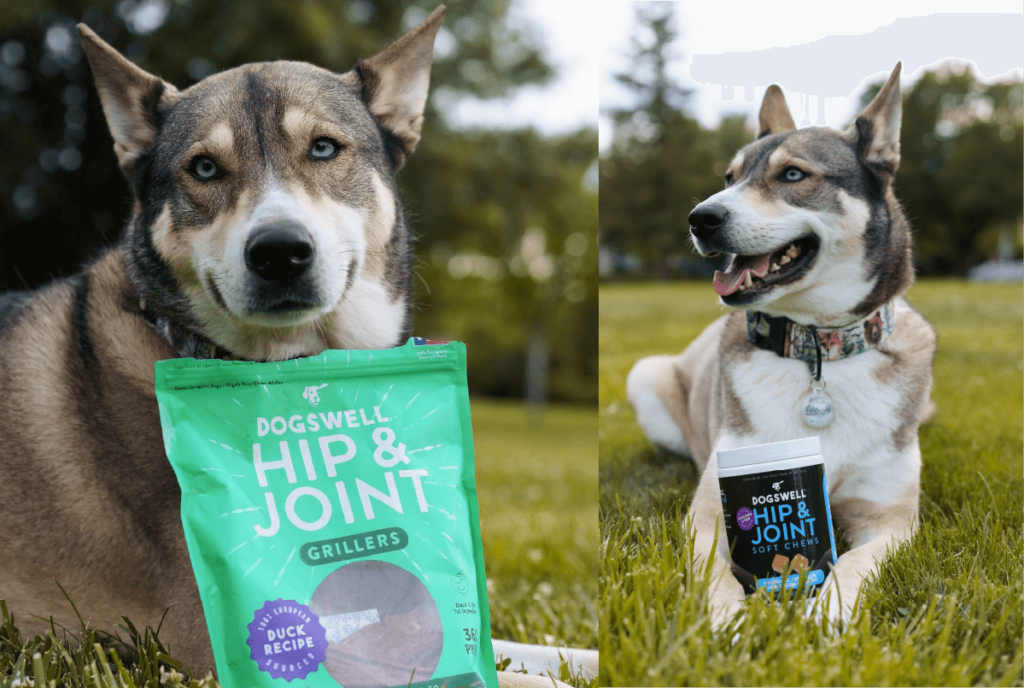A dog’s mobility has a huge impact on their life, affecting both their physical health and their quality of life. When movement becomes painful, it’s harder to do the things they need and want to do, like go for walks, use stairs, or even relieve themselves.
To say mobility is important is an understatement. It’s also a topic that’s near and dear to Dogswell. That’s because the idea for Dogswell Hip & Joint Treats was first sparked by one man’s wish to help his dog with hip dysplasia. As he was struggling to give her pills one day, he had an epiphany: what if hip and joint benefits could be administered in tasty, easy-to-give treats?
Since 2004, Dogswell has expanded to provide a full line of wellness solutions to keep dogs healthy and well. Being one of the first in the industry, we know quite a bit about supporting dogs’ hip and joint health. Below we will share answers to some of the most common questions we receive about hip and joint support for dogs.
Why do dogs need hip and joint support?
Like humans, dogs tend to slow down with age. You may notice them walking slower, having more difficulty with stairs, climbing into your vehicle, or simply standing up.
What are the benefits of joint treats and supplements for dogs?
Hip and joint treats and supplements for dogs are specially formulated with active ingredients that promote healthy mobility and relieve occasional joint pain and stiffness. These ingredients may include:
Glucosamine: This is a natural compound found in connective tissue that can help promote the production of collagen.
Chondroitin: Also naturally found in cartilage, chondroitin can help relieve discomfort and support healthy joints. Chondroitin is often used in conjunction with glucosamine.
Green lipped mussels (Perna canaliculus): A type of shellfish native to New Zealand, green lipped mussels are known for inflammatory support.
MSM: Methylsulfonylmethane is an organic sulfur compound that may help ease joint discomfort and stiffness.
Turmeric Root: This yellow spice contains a powerful compound called curcumin, which is known for its inflammatory support.
Boswellia Serrata Extract: This extract from the resin of the Boswellia Serrata tree is known to reduce inflammation associated with normal aging process.
Which breeds benefit most from joint support?
All breeds can enjoy the benefits of joint treats and supplements.

Can I combine hip and joint treats and supplements?
Yes, it is safe to give your dog both hip and joint supplements and hip and joint treats. Many dogs enjoy both! Just be sure to give the recommended amount listed on the packaging based on your dog’s size.
What’s the difference between hip and joint supplements and hip and joint treats?
Hip and joint supplements generally contain higher concentrations of active ingredients than hip and joint treats. However, they both contain ingredients that help promote healthy joints. When in doubt, you can give both to maximize benefits.
When should I start giving my dog joint support?
If your dog is over 7, definitely consider giving your dog joint treats or supplements. But, dogs can start taking them as soon as they reach adulthood. Always consult your veterinarian if you have any concerns about your dog’s joint health.
How do I choose a hip and joint treat for my dog?
There are many different hip and joint products for dogs in the market today. So, how do you choose which one is best for your dog? Consider the following:
- Flavor: Your dog won’t receive any joint benefits if they don’t eat it! Choose a flavor your dog loves. Dogswell Hip & Joint treats come in four meaty, mouthwatering flavors: chicken, duck, beef, and bacon.
- Form: What texture does your dog enjoy? Do they like jerky or soft treats? Dogswell offers a variety of options: Soft Strips, Grillers, Soft & Chewy, Meatballs, Jerky and Mini Jerky.
- Ingredients: Look for the active ingredients listed above.
- Research: Do some digging. Are the treats made in the U.S.? Is the company reputable? Have you read the reviews?
How else can I support my dog’s hip and joint health?
In addition to treats and supplements, the number one thing you can do to support your dog’s hips and joints is to help them maintain a healthy weight through proper nutrition and regular exercise. This helps maintain lean muscle mass, keep joints lubricated, and minimize stress on joints. As your dog ages, you may need to alter their exercise plan to shorter sessions and/or lower impact activities. You can also support their joints by providing soft places to rest, like a cushioned dog bed. If your dog has advanced arthritis, you can help them safely navigate your home by providing non-slip rugs and ramps for stairs. Talk to your veterinarian about what else you can do to help your dog’s specific condition.

